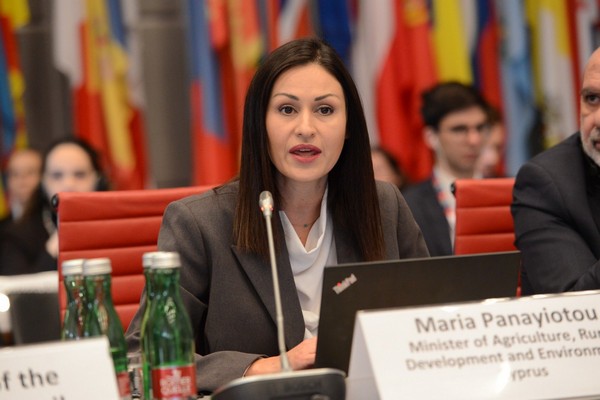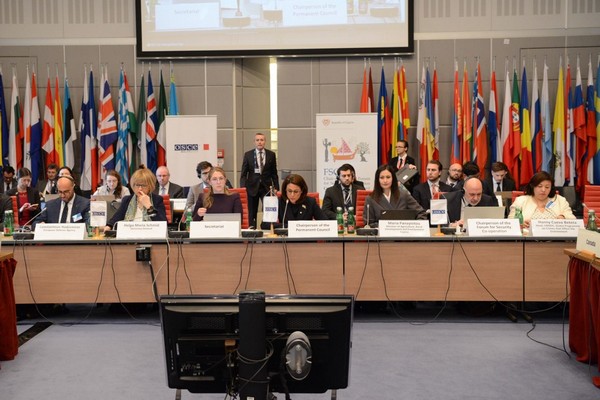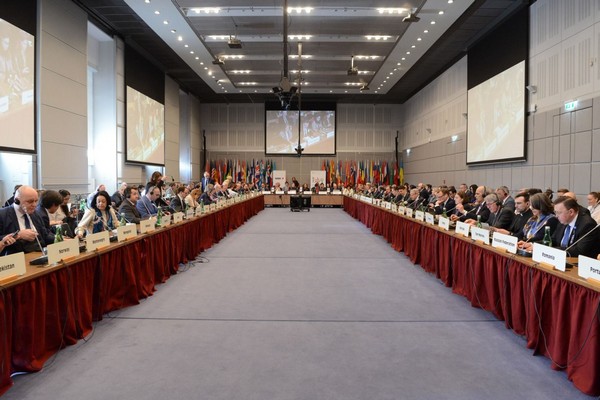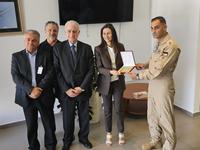Press Releases
21-02-2024 14:21
Keynote Speech by the Minister of Environment, Dr Maria Panayiotou, at the Joint Forum for Security Cooperation (FSC) – Permanent Council Security Meeting – Security Dialogue on “Environment and Security”
It is a great pleasure to be here at today’s joint Forum for Security Cooperation (FSC) –Permanent Council Security Meeting, and to have the opportunity to address this esteemed audience.
Environment and security have become all the more relevant and are thus a policy area which cannot be ignored; a global issue that requires a global response. In many regions of the world, the impacts of climate change are exacerbating conditions that threaten peace and security. Rising temperatures, extended droughts and intense storms are resulting in loss of livelihoods, increasing competition over scarce resources and fuelling migration and displacement.
The United Nations (UN), the European Union (EU) and the Organization for Security and Co-operation in Europe (OSCE) have already identified climate change as a threat multiplier, which exacerbates existing sources of instability, within already fragile and prone states and regions. To this end, OSCE Participating States have undertaken important commitments, which emphasise the nexus between security and the natural environment.
Since the 1975 Helsinki Final Act, the protection of the environment is considered as an integral component of the OSCE comprehensive approach to security. Other Ministerial Council documents have also reconfirmed these linkages and recognised that environmental cooperation and the promotion of early warning are useful tools in diminishing tensions as part of a broader effort to prevent conflict and build mutual confidence.
Moreover, in the 2019 report on Women, Peace and Security, the UN Secretary-General declared an “urgent need” for better analysis of the linkages between climate change and conflict from a gender perspective. Pre-existing inequalities and unequal access to resources can leave women disproportionately vulnerable. It is important, therefore, to assess the security risks emanating from climate change from a gender perspective in order to determine how women and men of different backgrounds are impacted by and respond to such crises.
It is evident that societies with rapid population growth and limited access to resources due to environmental conditions are highly vulnerable to security challenges, since these adverse circumstances may lead to food and energy insecurity, and also have a negative impact on employment, education and healthcare. Consequently, these challenges may pose a greater risk to women who are largely marginalised in economic, social and political spheres.
At the same time, environmental degradation can be a direct consequence of human activities, in particular man-made disasters triggered by military conflicts. The ongoing Russia’s war of aggression against Ukraine is the most vivid example of a military conflict causing sustained environmental degradation in the OSCE region. The destruction of the Kakhovka dam last year, for example, led to sweeping security repercussions on the environment and human health in the military theatre and beyond.
Based on the aforementioned analysis, it is evident that the international community cannot neglect or avoid the security dimension of climate change, since it has the potential to exacerbate situations of insecurity and conflict in the following ways:
Climate change can pose a threat to human rights and impact economic development. It is clear that the environment and the realisation of several human rights are inextricably linked. For instance, climate change can have a negative impact on the right to food, health, water and housing, as well as on economic growth, thus leading individuals and communities to situations of frustration and anger.
Climate change can lead to localised conflicts since it may lead to involuntary migration and competition within communities or groups over scarce resources. The reduction of arable land, water shortages, increased flooding and prolonged droughts will inevitably lead to population shifts and illegal migration, increasing the pressure.
Climate change can threaten the very survival of states, such as small island nations through sea-level rise and the resultant loss of national territory. In this respect, climate change may lead to statelessness and consequently generate vast amounts of displaced populations, thus triggering disputes with neighbours.
Last but not least, climate change can lead to territorial disputes between countries through the scarcity of natural resources.
For Cyprus, it is important to underline the importance of this issue, since we have experienced severe natural and man-made disasters in the past, such as floods, landslides, forest fires, sea pollution and earthquakes. As a small island nation, our experience has shown that security forces are often the best equipped to deal with disaster management. Military forces are highly effective when responding to humanitarian crisis situations due to their operational capabilities that allow them to operate in any weather and terrain. In this framework, over the years the mission of the Armed Forces has evolved to include both support to disaster response efforts and the provision of humanitarian assistance.
On the other hand, it is also important to note the significance of regional cooperation when addressing unfolding disasters, since the security forces of neighbouring countries have often joined forces to tackle emergency situations. There are several such examples where neighbouring countries have cooperated to deal with forest fires (in Portugal, Greece and my own country Cyprus), floods (in Greece or Libya) or earthquakes (such as the devastating one last year in Türkiye), in order to effectively and swiftly address their huge effects on the environment.
Cyprus also recognises that promoting sustainability in the armed forces is a win-win approach for the defence sector, since the armed forces can benefit from the greater availability of resources from an operational point of view. In this framework, there have been adopted specific measures to adopt renewable energy and promote energy security in the defence sector.
Allow me to present some examples of this approach as they were adopted by the Ministry of Defence of the Republic of Cyprus:
The Ministry of Defence of the Republic of Cyprus acknowledges its environmental and social responsibilities as well as the importance of having a solid environmental and energy policy.
In this regard, the Ministry of Defence hosted in February 2019 the 3rd meeting of the consultation forum for sustainable energy in the Defence and Security Sector, with the aim to share information and best practices on improving energy management and efficiency, the use of renewable energy, as well as on actions to increase the “energy” resilience of military critical infrastructures.
Consequently, through sustainable environmental and energy management, the Ministry of Defence of Cyprus aims to maintain the operational capabilities of the National Guard. To this end, in 2005, we established the Environmental Committee of the Ministry of Defence, which in 2006 published for the first time the Defence Environmental Policy.
According to this policy, an environmentally-friendly management system has been adopted at six major military camps in Cyprus, which includes the development of Renewable Energy Sources and the implementation of waste recycling programmes. Moreover, military personnel follow training programmes to increase their awareness on environmental policies and efficient energy management practices.
In conclusion, I would like to underline Cyprus’ firm conviction that the OSCE is particularly suited to identify and address the increasingly complex linkages between security and the natural environment.
As a recommendation for future discussions, I would underline the necessity to reassess the contemporary role of the Security Forces. In our view, the intervention of security forces is inevitable when addressing natural or man-made disasters in order to effectively assist civil authorities in providing humanitarian relief and preventing further loss of lives and property. Thus, this evolving role should steadily be incorporated into the defence policies of participating states and reflected in the operational capabilities of our Armed Forces.
We are confident that the discussions today at this joint FSC/PC meeting will enrich our knowledge on the evolving role of security forces in responding to such crises and assess ways to reduce the impact of military activities on the environment. I would like to thank our expert panellists for their presence here today and for the expertise I am sure they will bring to today’s deliberations.
(EN/IA/GS)









